|
|
|
Sort Order |
|
|
|
Items / Page
|
|
|
|
|
|
|
| Srl | Item |
| 1 |
ID:
164974
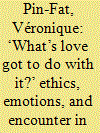

|
|
|
|
|
| Summary/Abstract |
By paying attention to love, this article offers a grammatical reading of International Relations’ founding grammar of inside/outside as an ethics of encounter. The decision to focus on love is, I suggest, to contend with the possibility that IR may express a lethal politics and ethics. I seek to substantiate this claim through an unsettling reading of neo-Jamesian contributions to the emotional turn. I conclude that the discipline’s founding grammar is an ‘avoidance of love’ and offer a reminder that an alternative way of loving is possible.
|
|
|
|
|
|
|
|
|
|
|
|
|
|
|
|
| 2 |
ID:
164985
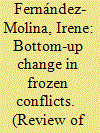

|
|
|
|
|
| Summary/Abstract |
This article proposes a typology of causal mechanisms whereby transnational relations of recognition constitute conflict actors in frozen conflicts. While the agency of an emerging conflict actor manifests itself in ‘struggles for recognition’ motivated by experiences of ‘disrespect’, responses from different significant others vary in terms of motivations and pathways (mechanisms of recognition). Adapting Honneth’s tripartite division, the typology distinguishes between four forms of recognition: thin cognitive recognition, ‘respect’/rights, ‘esteem’/difference, and ‘love’/empathy. Three transnational corrections are made in order to include transnational relations of recognition, non-state actors, and unstructured social-relational forms of international/transnational recognition. The typology is applied to the conflict of Western Sahara, which has been reshaped by the rise of internal Sahrawi pro-independence groups (based inside the territory annexed by Morocco) as an increasingly relevant conflict actor, with their identity shifting from victims to human rights activists to activists involved in an unsolved conflict. This identity and social-status formation has been the product of transnational recognition from three significant others: the annexing state (Morocco), the contested state-in-exile (SADR), and the international community. The overall effect of intermingling recognition processes, including various instrumental initiatives deprived of mutuality, has been increased struggle and conflict complexity rather than ‘recognitional peace’.
|
|
|
|
|
|
|
|
|
|
|
|
|
|
|
|
| 3 |
ID:
164980
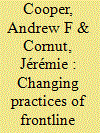

|
|
|
|
|
| Summary/Abstract |
This article develops the concept of ‘frontline diplomacy’ – what practitioners referring to work in embassies, consulates, and permanent representation as ‘the field’ –, defined here as all diplomats’ activities taking place away from headquarters. IR scholarship tends to focus on Ministries of Foreign Affairs located in capitals. On the contrary, building on the practice turn in IR, we first show that international politics emerge from frontline practices. Adding to criticism against the practice turn, we then explain that it has missed important transformations occurring in frontline diplomacy because it tends to privilege stability over change. We finally discuss two innovations in frontline practices: the action of Sherpas in G20 summits following the 2008 crisis and the use of Twitter by US Ambassador to Russia Michael McFaul (2012–14). For each we answer three questions: How do these activities transform traditional modes of operation? How are non-state actors involved in them? What do they tell about transformation of global politics? Because diplomatic practices at the frontlines epitomise international politics, these new directions for inquiry contribute substantively to IR scholarship. At the theoretical level, they enrich the continuing encounter between IR and diplomatic studies through practice theory and help to understand change in practice.
|
|
|
|
|
|
|
|
|
|
|
|
|
|
|
|
| 4 |
ID:
164984
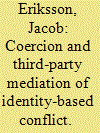

|
|
|
|
|
| Summary/Abstract |
This article analyses third-party mediation of identity-based conflicts, which are notoriously difficult to resolve. It seeks to reconcile the contradiction in the mediation literature between the need for less coercive strategies to ensure ownership of a peace agreement and the need for more coercive strategies to reach a final agreement. Through an analysis of mediation of the Israeli-Palestinian conflict, the article makes four contributions to existing literature. First, the article develops a theoretical ‘best fit’ model that proposes a u-shaped relationship between intensity of mediator coercion and transition through phases of negotiation. Second, it challenges the prevailing notion that pre-negotiation does not involve coercion. Third, it suggests that epistemological and ontological understandings of a conflict and the role of a mediator by both the mediator and the parties mean that mediators enjoy limited capacity to effectively shift from high- to low-coercive strategies. Multi-party mediation can provide the flexibility needed to execute the coercion u-curve effectively. Fourth, it challenges existing understandings of the US-mediated negotiations during the Annapolis process, 2007–08.
|
|
|
|
|
|
|
|
|
|
|
|
|
|
|
|
| 5 |
ID:
164981
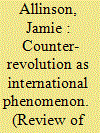

|
|
|
|
|
| Summary/Abstract |
This article argues that the case of the Egyptian 2011 revolution forces us to rethink accounts of counter-revolution in International Relations. The debate over whether the events of 2011–13 in Egypt should be considered a ‘revolution’ or merely a ‘revolt’ or ‘uprising’ reflects an understanding of revolutions as closed and discrete events, and therefore of international counter-revolution as significant only after revolutionary movements have seized sovereign power. Against this account, which maintains the idea of sovereignty as the boundary between domestic/social and international/ geopolitical phenomena, I argue that counter-revolutions can operate across boundaries during revolutionary situations before and to prevent revolutionary transformation and therefore affect whether a revolutionary sovereign power is established at all. Such counter-revolutions draw upon both the ideological inheritance of historical strategies of international ‘catch-up’, and the cross-border class relations that these different strategies bring into being. In the Egyptian case, the counter-revolution thus relied upon two factors deriving from this strategy: the ideological inheritance of Nasserism as a response to international hierarchy, and the integration of the post-Nasser Egyptian ruling elite with Gulf financial, and US security, networks.
|
|
|
|
|
|
|
|
|
|
|
|
|
|
|
|
| 6 |
ID:
164979
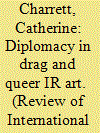

|
|
|
|
|
| Summary/Abstract |
This article presents drag performance as a queer method of critique in the field of IR, which contributes to a longstanding move in IR to engage with aesthetics, and a more recent move to engage with performance art. The article discusses the author’s making of a performance piece that revisited the EU’s response to Hamas’s success in the 2006 Palestinian legislative elections. Soft, camp, feminine, and childlike voices; a female body in men’s clothing; and the translocation of bodies in spaces are used in the performance piece to disrupt the coherency of normalised diplomacy. Queer IR theory emphasises the imperative to dismantle logics of normality that prevent creativity in response to political issues. Performative drag practices disrupt anxious attachments to a ritualised discourse of strategic interests that shapes political initiatives. This article comments on other drag moments in politics, such as the anxiety around Jeremy Corbyn’s dress, Barack Obama’s anger translator, and Janelle Monáe’s androgynous articulation of community. The form that research dissemination takes implicates the kind of knowledge that is produced. This article reviews three methodological provocations of drag, an alternative departure point of the ‘what if’, performing a politics of refusal, and a Brechtian technique of estrangement.
|
|
|
|
|
|
|
|
|
|
|
|
|
|
|
|
| 7 |
ID:
164976
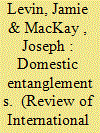

|
|
|
|
|
| Summary/Abstract |
This article revisits the Hobbesian account of the state of nature and the formation of states, attending to Hobbes’s account of the family. Drawing on feminist readings, we find in the Leviathan an account of the family as a natural political community. We contend specifically that a focus on conceptions of family life in the Leviathan, and in works by Hobbes’s early modern peers, points to the role of the family as a site of socialisation in the prelude to early state formation and in the formation of political hierarchies more generally – including, we suggest, the formation of international hierarchies. These accounts have thus far been missing from International Relations theory. Contra conventional IR theoretic readings of the Leviathan, the Hobbesian state of nature contains the seeds of both anarchy and hierarchy, as overlapping social configurations. While anarchy emerges clearly in the famous condition of ‘war of all against all’, hierarchy also exists in Hobbes’s depiction of family life as a naturally occurring proto-state setting. On the basis of this contemporary feminist analysis of a classic text, we consider implications for the emerging ‘new hierarchy studies’ in IR.
|
|
|
|
|
|
|
|
|
|
|
|
|
|
|
|
| 8 |
ID:
164978
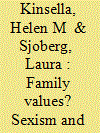

|
|
|
|
|
| Summary/Abstract |
In this article, we focus on the subset of evolutionary theorising self-identified as Feminist Evolutionary Analytic (FEA) within security studies and International Relations. We offer this accounting in four sections. First, we provide a brief overview of the argument that reproductive interests are the ‘origins’ of international violence. Second, we break down the definitions of gender, sex, and sexuality used in evolutionary work in security studies generally and in FEA specifically, demonstrating a lack of complexity in FEA’s accounts of the potential relations among the three and critiquing their essentialist heteronormative assumptions. Third, we argue that FEA’s failure to reflect on the history and context of evolutionary theorising, much less contemporary feminist critiques, facilitates its forwarding of the state and institutions as primarily neutral and corrective bulwarks against male violence. Fourth, we conclude by outlining what is at stake if we fail to correct for this direction in feminist, IR, and security research. We argue that FEA work misrepresents and narrows the potential for understanding and responding to violence, facilitating the continued instrumentalisation of women’s rights, increased government regulation of sexuality, and a more expansive form of militarism.
|
|
|
|
|
|
|
|
|
|
|
|
|
|
|
|
| 9 |
ID:
164975
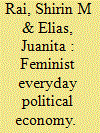

|
|
|
|
|
| Summary/Abstract |
It goes without saying that feminist International Political Economy (IPE) is concerned in one way or another with the everyday – conceptualised as both a site of political struggle and a site within which social relations are (re)produced and governed. Given the longstanding grounding of feminist research in everyday gendered experiences, many would ask: Why do we need an explicit feminist theorisation of the everyday? After all, notions of everyday life and everyday political struggle infuse feminist analysis. This article seeks to interrogate the concept of the everyday – questioning prevalent understandings of the everyday and asking whether there is analytical and conceptual utility to be gained in articulating a specifically feminist understanding of it. We argue that a feminist political economy of the everyday can be developed in ways that push theorisations of social reproduction in new directions. We suggest that one way to do this is through the recognition that social reproduction is the everyday alongside a three-part theorisation of space, time, and violence (STV). It is an approach that we feel can play an important role in keeping IPE honest – that is, one that recognises how important gendered structures of everyday power and agency are to the conduct of everyday life within global capitalism.
|
|
|
|
|
|
|
|
|
|
|
|
|
|
|
|
| 10 |
ID:
164982
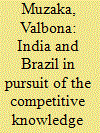

|
|
|
|
|
| Summary/Abstract |
The aim of this article is twofold: first, it seeks to address the question of why the competitive knowledge economy orientation that emerged in certain economically advanced states as a response to the crisis of Fordism came to be embraced by the Indian and the Brazilian states from the late 1980s onwards. Second, it aims to elucidate the manner in which the goal of becoming competitive knowledge economies has been articulated and implemented locally, especially from the mid-1990s onwards, by key fragments of the Indian and the Brazilian states. Drawing on insights from the competition state, regulation school, knowledge economy literature and that on India and Brazil, attention is paid to the context- and conjuncture-specific domestic and international factors that have contributed not only to the adoption of the competitive knowledge economy orientation, but also to the necessarily distinctive ways in which it found expression in practice in India and Brazil.
|
|
|
|
|
|
|
|
|
|
|
|
|
|
|
|
| 11 |
ID:
164989


|
|
|
|
|
| Summary/Abstract |
The United States presidential election of Donald Trump in 2016 was observed by global health commentators as posing dire consequences for the progress made in global health outcomes, governance, and financing. This article shares these concerns, however, we present a more nuanced picture of the global health governance progress narrative pre-Trump. We argue that Trump’s presidency is a displacement activity to which global health’s pre-existing inequalities and problems of global health security, financing, and reproductive health can be attributed. Unfettered access to sexual and reproductive rights, sustained financing of health system strengthening initiatives, affordable medicines and vaccines, and a human security-centred definition of global health security were already problematic shortfalls for global health governance. Trump no doubt exacerbates these concerns, however, to blame his presidency for failings in these areas ignores the issues that have been endemic to global health governance prior to his presidency. Instead of using Trump as a displacement activity, his presidency could be an opportunity to confront dependency on US financing model, the lack of a human-security centred definition of global health security, and the norm of restricting reproductive health. It is such engagement and confrontation with these issues that could see Trump’s presidency as being a catalyst for change rather than displacement as a means of preserving the uncomfortable status quo in global health. We make this argument by focusing on three specific areas of US-led global health governance: reproductive health and the ‘global gag rule’, health financing and the President’s Emergency Plan for AIDS Relief (PEPFAR), and pandemic preparedness and global health security.
|
|
|
|
|
|
|
|
|
|
|
|
|
|
|
|
| 12 |
ID:
164983


|
|
|
|
|
| Summary/Abstract |
In this article, we propose a reconciliation between global equality of opportunity and self-determination, two central and seemingly conflicting principles in the contemporary theory of global justice. Our conception of reconciliation draws on the family-people analogy, following the account of familial relationship goods, developed by Harry Brighouse and Adam Swift, on permissible parental partiality and domestic equality of opportunity. We argue, first, that a plausible conception of global equality of opportunity must be able to distinguish morally arbitrary aspects of nationality that require mitigation from morally permissible ones. Second, we argue that a plausible criterion for the distinction integrates a person’s normative interests over a lifetime: (i) the interests of a child born into societal circumstances that impact her life prospects; and (ii) the interests of an adult citizen in collective self-determination. Third, we outline an account of ‘people relationship goods’, as a principled way to circumscribe the permissible scope of self-determination. Fair global equality of opportunity requires mitigating nationality-tracking inequalities, except those that fall within the permissible scope of collective self-determination.
|
|
|
|
|
|
|
|
|
|
|
|
|
|
|
|
| 13 |
ID:
164986
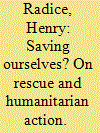

|
|
|
|
|
| Summary/Abstract |
This article contributes to the international political theory of humanitarianism by unpicking the politics of humanitarian action’s simplest expression: saving human lives in the name of humanity. Both saving lives and defining notions of common humanity are closely interrelated acts of power. What saving a life means depends on a prior definition of humanity; humanitarians’ acts of rescue are the measure of their commitment to humanity. The politics of rescue and the politics of humanity are inextricably linked. The article explores four facets of this nexus. First, it considers the meanings of rescue, from saving bodies to saving lives, linked to contingent understandings of humanity. Second, it turns to the rescuers, for whom rescue performs particular functions, not least the need to preserve a sense of self. Third, it situates their often narcissistic motives in relation to the consequences of humanitarian action. Fourth, it addresses the power imbalance inherent in rescue and the problem of causing harm. It concludes that rescue is always an act of presumption, but one that can be tempered by humanitarian actors willing to embrace their role as ‘moral politicians’ (Walzer), aware of their power and their dirty hands, and open to contrasting understandings of humanity.
|
|
|
|
|
|
|
|
|
|
|
|
|
|
|
|
| 14 |
ID:
164988
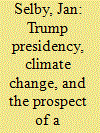

|
|
|
|
|
| Summary/Abstract |
This article reflects on the implications of the Trump presidency for global anthropogenic climate change and efforts to address it. Existing commentary, predicated on liberal institutionalist reasoning, has argued that neither Trump’s promised rollback of domestic climate-related funding and regulations, nor withdrawal from the Paris framework, will be as impactful as often feared. While broadly concurring, I nonetheless also in this article take a wider view, to argue that the Trump administration is likely to exacerbate several existing patterns and trends. I discuss four in particular: the general inadequacy of global greenhouse gas emissions reduction targets and implementation efforts; the inadequacy of contemporary climate financing; the embrace between populist conservatism and opposition to action on climate change; and not least, the current global oil and gas boom which, crucially, is being led by the US. I submit that these patterns and trends, and the Trump administration’s likely contributions to them, do not augur well for climate change mitigation, let alone for an orderly transition to a low-carbon global economy. Given current directions of travel, I suggest, this coming transition is likely to be deeply conflict-laden – probably violently so – and to have consequences that will reverberate right across mid-twentieth-century international order.
|
|
|
|
|
|
|
|
|
|
|
|
|
|
|
|
| 15 |
ID:
164977
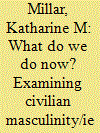

|
|
|
|
|
| Summary/Abstract |
In contemporary Western, liberal democratic societies, the soldier is frequently regarded as ‘the best of us’, taking on the unlimited liability for the protection and betterment of the whole. In the context of volunteer militaries and distant conflicts, the construction of men (and the universalised masculine citizen) as ‘always-already’ soldiers (or potential soldiers) poses a substantial obstacle to the identification or performance of ‘good’ civilian masculinity – particularly during wartime. The theorisation and articulation of a positive, substantive civilian masculinity, or masculinities, rather than one defined simply by an absence of military service and implication in the collective use of violence, is a central challenge of contemporary politics. As a means of illuminating the complex dynamics of this challenge, this article examines charitable practices of civilian support for the military, and corresponding constructions of masculinity, in the UK during the ‘war on terror’. In doing so, the article demonstrates the ways in which gendered ‘civilian anxiety’, through its connection to citizenship, comes to condition the political possibilities and subjectivities of all those who seek belonging in the liberal political community. The article concludes by arguing for the essentiality of a research programme oriented around ‘civilianness’, and civilian masculinity/ies.
|
|
|
|
|
|
|
|
|
|
|
|
|
|
|
|
| 16 |
ID:
164987


|
|
|
|
|
| Summary/Abstract |
How is Xi Jinping changing the course of China’s rise? Based on a Gramscian analytical framework inspired by Bob Jessop, this article provides an anatomy of Xiism (2012–) as an emergent hegemonic project, that is, a (fallible and contested) attempt by China’s party-based power bloc of altering global power balances in China’s favour while retaining domestic stability. Through juxtaposition with Maoism (1957–76) and Dengism (1978–2012), it is proposed that Xiism reformulates the power bloc’s strategy in three respects. First, the ideological vision of the ‘Chinese Dream’ negates Mao’s utopian-egalitarian universalism while readjusting Deng’s pro-market approach by emphasising ‘common prosperity’. Second, the economic accumulation strategy – built around the hyped Belt and Road Initiative – aims to reshape global trade and production patterns in a way that particularly benefits the state-owned sector, the Party leadership’s economic base. Third, Xi’s state project seeks to amalgamate Mao-style charismatic leadership and intra-party ‘self-rectification’ campaigns with both a Dengist commitment to political stability and traditional Chinese statecraft. The crucial issue for the coming decade is whether the Xi leadership will prove able to paper over the contradictions of this emergent ‘China Model’ and win support for it both at home and abroad.
|
|
|
|
|
|
|
|
|
|
|
|
|
|
|
|
|
|
|
|
|